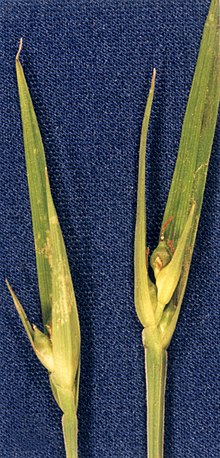Carex backii, commonly known as Back's sedge, is a species of sedge (Carex) in the section Phyllostachyae.[1] First described scientifically in 1839 by American botanist Francis Boott, it is found in Canada and the United States, where it grows in shaded woods, shaded slopes, and shrub thickets.[1][2]
| Carex backii | |
|---|---|

| |
| Scientific classification | |
| Kingdom: | Plantae |
| Clade: | Tracheophytes |
| Clade: | Angiosperms |
| Clade: | Monocots |
| Clade: | Commelinids |
| Order: | Poales |
| Family: | Cyperaceae |
| Genus: | Carex |
| Section: | Carex sect. Phyllostachyae |
| Species: | C. backii
|
| Binomial name | |
| Carex backii | |
Description
editThe plants have culms that grow 3–25 cm (1.2–9.8 in) high, and deep-green to yellowish-green leaves measuring 2–5 mm wide. The inflorescence is typically a single terminal spike lacking a spike bract.[1]
References
edit- ^ a b c Leighton AL. (2012). Sedges (Carex) of Saskatchewan. Flora of Saskatchewan. Vol. Fascicle 3. Regina, Canada: Nature Saskatchewan. p. 78. ISBN 978-0-921104-29-2.
- ^ "Carex backii Boott in W. J. Hooker". Flora of North America. www.eFloras.org. Retrieved 2014-12-19.